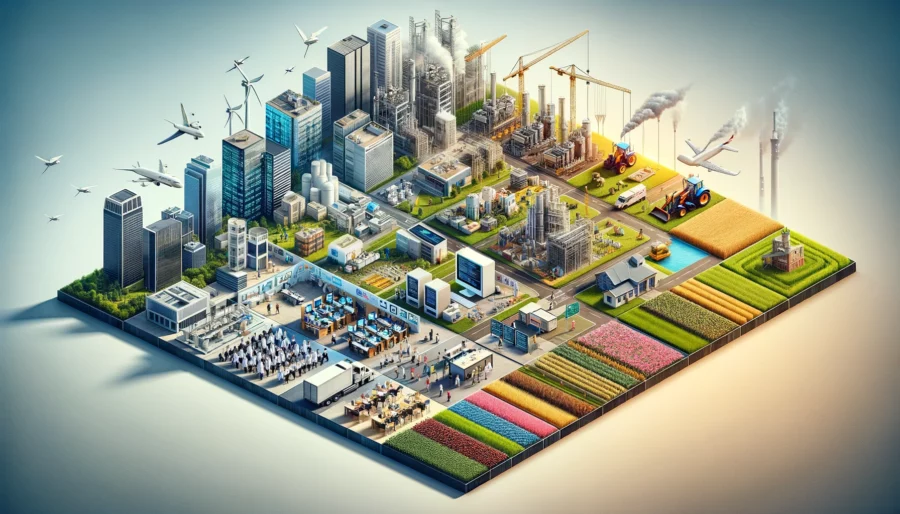
AI, or artificial intelligence, is not just a buzzword anymore; it’s the driving force behind transformative changes in nearly every industry. From enhancing customer experiences to optimizing operations, AI is the superstar technology that’s shaking things up everywhere. But what exactly makes AI so beneficial, and how is it impacting different sectors? Let’s dive in!
Introduction
Artificial Intelligence (AI) has gone from sci-fi fantasy to real-world necessity in just a few short years. It’s now embedded in our daily lives and businesses, quietly making everything smarter and more efficient. Whether it’s large language models, machine learning, or voice recognition, AI technologies are bringing a new level of innovation to various industries. So, let’s break down the benefits and see how AI is reshaping our world.
AI in Healthcare: A Revolution in Care
One of the most profound impacts of AI is in healthcare. Imagine a world where diagnoses are quicker, treatments are more personalized, and administrative tasks are automated. Well, that’s not the future—it’s happening now!
- Diagnostics and Treatment Plans: Machine learning algorithms can analyze medical data faster and more accurately than humans. They identify patterns in data, helping doctors diagnose diseases earlier and develop more effective treatment plans. For instance, IBM’s Watson can analyze the meaning and context of structured and unstructured data in clinical notes and reports, aiding oncologists in identifying potential treatment options for cancer patients.
- Predictive Analytics: AI-powered predictive analytics are revolutionizing how healthcare providers anticipate and respond to patient needs. Hospitals can predict patient admission rates, helping them manage resources more effectively.
- Administrative Efficiency: AI helps automate routine administrative tasks, from scheduling appointments to managing medical records, freeing up healthcare professionals to focus more on patient care.
AI in Finance: Smarter, Faster, Safer
The finance industry is another area where AI is making significant strides. It’s all about making smarter decisions, faster transactions, and enhancing security.
- Fraud Detection: AI systems can analyze transaction patterns and detect fraudulent activity in real-time, providing an extra layer of security for financial institutions and their customers.
- Customer Service: Chatbots and virtual assistants powered by large language models provide 24/7 customer support, handling inquiries and resolving issues without human intervention. This improves customer satisfaction and reduces operational costs.
- Investment Strategies: Machine learning algorithms can analyze vast amounts of data to identify trends and make investment recommendations, helping investors make better-informed decisions.
AI in Retail: Enhancing Customer Experiences
Retailers are using AI to transform how they interact with customers and manage their operations.
- Personalized Shopping Experiences: AI algorithms analyze customer data to provide personalized product recommendations, enhancing the shopping experience and increasing sales. Think about how Amazon suggests products based on your browsing history—yep, that’s AI at work.
- Inventory Management: AI helps retailers optimize their inventory by predicting demand and managing stock levels. This reduces costs and ensures that customers can find what they’re looking for.
- Voice Recognition: With the rise of voice-activated devices like Amazon’s Alexa and Google Assistant, voice recognition technology is becoming a crucial part of the retail experience. Customers can search for products, place orders, and get customer support through simple voice commands.
AI in Manufacturing: Optimizing Production
In manufacturing, AI is synonymous with efficiency and precision.
- Predictive Maintenance: AI-powered predictive maintenance helps manufacturers anticipate equipment failures before they happen, reducing downtime and maintenance costs.
- Quality Control: Machine learning algorithms can analyze products on the production line, identifying defects and ensuring high quality standards. This speeds up the production process and reduces waste.
- Supply Chain Optimization: AI can optimize supply chain operations by predicting demand, managing inventory, and coordinating logistics. This leads to faster production cycles and more responsive supply chains.
AI in Education: Personalizing Learning
Education is another sector where AI is making waves, offering personalized learning experiences and administrative efficiencies.
- Customized Learning Plans: AI can create personalized learning plans based on a student’s strengths and weaknesses. Platforms like Khan Academy use AI to tailor lessons to individual students, making learning more effective.
- Automated Grading: AI-powered tools can grade exams and assignments, providing immediate feedback to students and freeing up educators to focus on teaching.
- Virtual Tutors: AI-based virtual tutors can assist students outside of the classroom, offering help and resources whenever they need them.
AI in Transportation: Driving Innovation
From self-driving cars to smarter logistics, AI is at the forefront of the transportation industry.
- Autonomous Vehicles: Companies like Tesla and Waymo are using AI to develop self-driving cars, which promise to reduce accidents and make transportation more efficient.
- Traffic Management: AI can analyze traffic patterns and optimize traffic light control, reducing congestion and improving commute times.
- Logistics: AI helps logistics companies optimize routes and manage fleets more efficiently, saving time and reducing costs.
The Future Possibilities with AI
The possibilities with AI are virtually limitless. As AI continues to evolve, we can expect even more innovative applications across various industries. Here are a few exciting possibilities:
- AI in Agriculture: AI can help farmers monitor crop health, optimize irrigation, and predict yields, making farming more sustainable and efficient.
- AI in Entertainment: AI is already being used to create realistic special effects in movies and to generate music. Future applications could include personalized content creation and virtual reality experiences.
- AI in Environmental Conservation: AI can help monitor and protect endangered species, predict natural disasters, and manage natural resources more effectively.
Conclusion
Artificial Intelligence is more than just a technological advancement; it’s a revolution that’s transforming industries across the globe. From healthcare and finance to retail and transportation, the benefits of AI are vast and varied. By improving efficiency, enhancing customer experiences, and enabling new possibilities, AI is paving the way for a smarter, more connected world. So, whether you’re a business owner, a tech enthusiast, or just curious about the future, now’s the perfect time to embrace the AI revolution.
